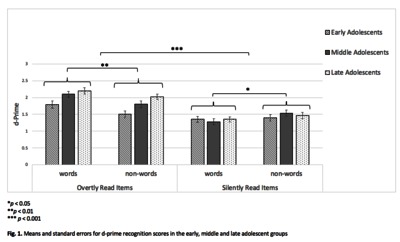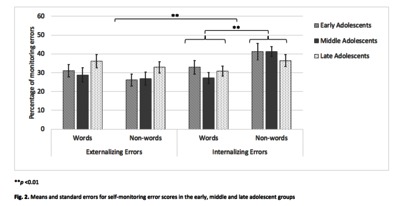Salaminios, G;
Morosan, L;
Toffel, E;
Tanzer, M;
Eliez, S;
Debbané, M;
(2020)
Self-Monitoring for speech and its links to age, cognitive effort, schizotypal trait expression and impulsivity during adolescence.
Cognitive Neuropsychiatry
, 25
(3)
pp. 215-230.
10.1080/13546805.2020.1734552.

Preview |
Text (Article)
Salaminios_self-monitoring_manuscript.pdf - Accepted Version Download (1MB) | Preview |
![[thumbnail of Figure 1]](https://discovery.ucl.ac.uk/10097292/3.hassmallThumbnailVersion/Fig.%201.png)  Preview |
Image (Figure 1)
Fig. 1.png - Accepted Version Download (63kB) | Preview |
![[thumbnail of Figure 2]](https://discovery.ucl.ac.uk/10097292/9.hassmallThumbnailVersion/Fig.2.png)  Preview |
Image (Figure 2)
Fig.2.png - Accepted Version Download (74kB) | Preview |
Abstract
Introduction: Disruptions in self-monitoring processes represent key cognitive factors associated with schizophrenia spectrum disorders. In the current study, we assessed the effects of age and cognitive effort on self-monitoring for speech in adolescence, as well as its associations with personality dimensions pertaining to schizotypy and impulsivity. / Methods: 121 community adolescents undertook a self-monitoring task that assesses the capacity to discriminate between self-generated overt and silent speech, for items requiring different levels of cognitive effort. Self-report measures were used to assess trait dimensions of schizotypy and impulsivity. / Results: Cognitive effort, but not age, contributed to the overall rate of self-monitoring errors. Contrary to clinical psychosis and high risk samples, increased cognitive effort in healthy adolescents led to more internalising than externalising self-monitoring errors. Higher scores on the interpersonal dimension of schizotypy were associated with increases in the total rate of self-monitoring errors. No associations were found between positive schizotypy and externalising self-monitoring misattributions. Finally, trait impulsivity dimensions were not associated with self-monitoring performance. / Conclusions: The present findings suggest that self-monitoring confusions may be linked to trait-risk for psychosis in adolescence. Future studies can prospectively assess whether the association between negative schizotypal traits and self-monitoring represents a distal marker of psychosis vulnerability.
Archive Staff Only
 |
View Item |


